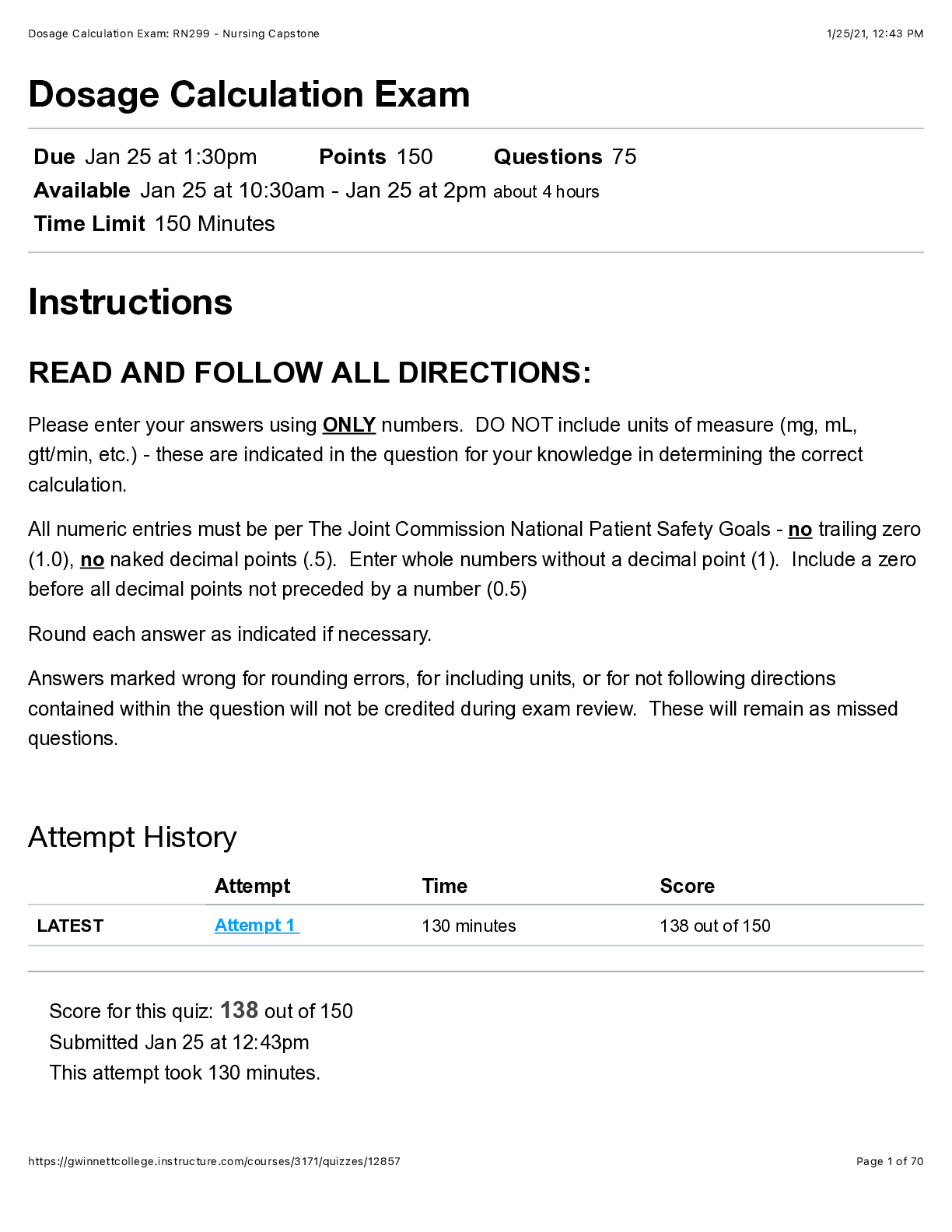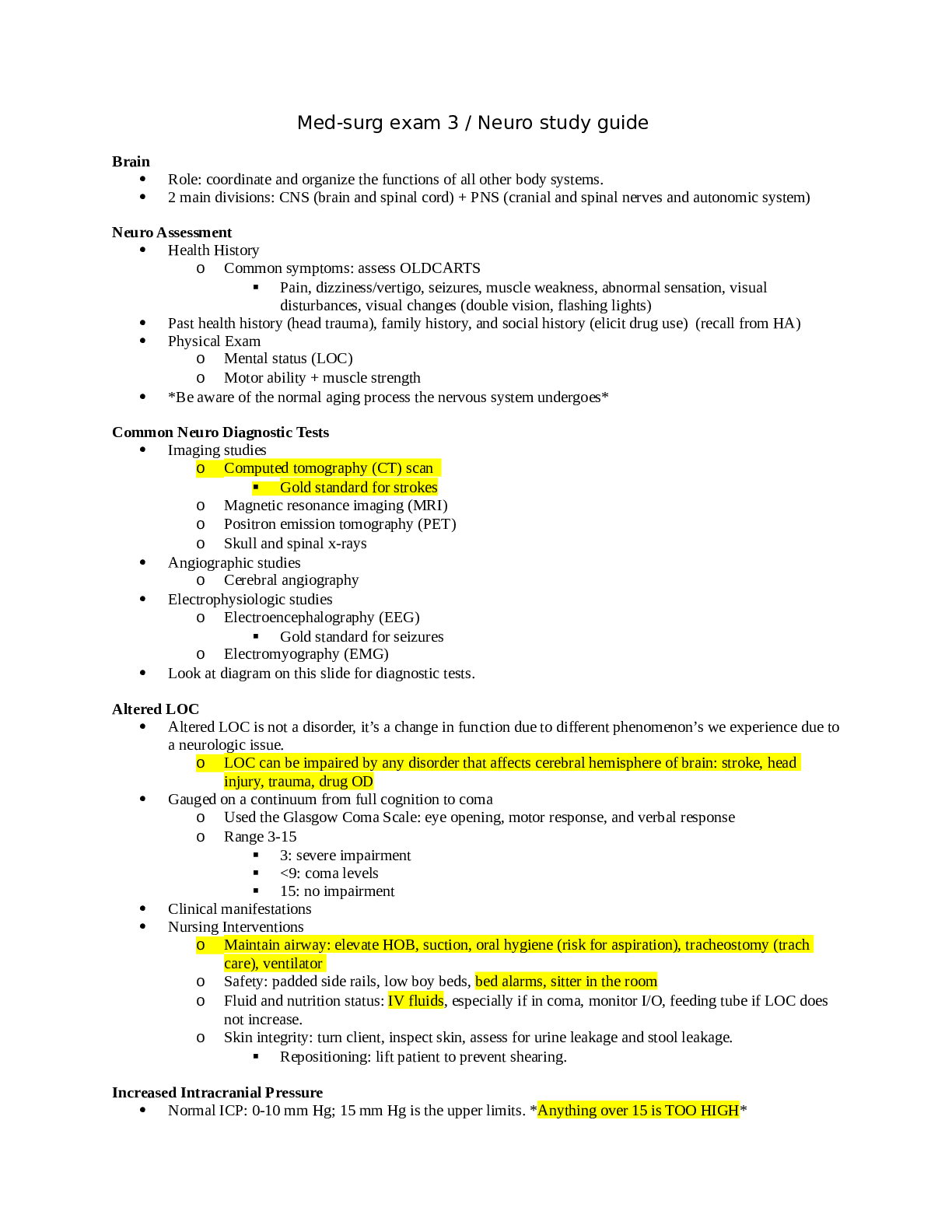
Dosage Calculation Exam: RN299 - Nursing Capstone.
Health Care > STUDY GUIDE > MedSurg study guide (All)
Med-surg exam 3 / Neuro study guide Brain Role: coordinate and organize the functions of all other body systems. 2 main divisions: CNS (brain and spinal cord) + PNS (cranial and spinal nerv ... es and autonomic system) Neuro Assessment Health History o Common symptoms: assess OLDCARTS Pain, dizziness/vertigo, seizures, muscle weakness, abnormal sensation, visual disturbances, visual changes (double vision, flashing lights) Past health history (head trauma), family history, and social history (elicit drug use) (recall from HA) Physical Exam o Mental status (LOC) o Motor ability + muscle strength *Be aware of the normal aging process the nervous system undergoes* Common Neuro Diagnostic Tests Imaging studies o Computed tomography (CT) scan Gold standard for strokes o Magnetic resonance imaging (MRI) o Positron emission tomography (PET) o Skull and spinal x-rays Angiographic studies o Cerebral angiography Electrophysiologic studies o Electroencephalography (EEG) Gold standard for seizures o Electromyography (EMG) Look at diagram on this slide for diagnostic tests. Altered LOC Altered LOC is not a disorder, it’s a change in function due to different phenomenon’s we experience due to a neurologic issue. o LOC can be impaired by any disorder that affects cerebral hemisphere of brain: stroke, head injury, trauma, drug OD Gauged on a continuum from full cognition to coma o Used the Glasgow Coma Scale: eye opening, motor response, and verbal response o Range 3-15 3: severe impairment <9: coma levels 15: no impairment Clinical manifestations Nursing Interventions o Maintain airway: elevate HOB, suction, oral hygiene (risk for aspiration), tracheostomy (trach care), ventilator o Safety: padded side rails, low boy beds, bed alarms, sitter in the room o Fluid and nutrition status: IV fluids, especially if in coma, monitor I/O, feeding tube if LOC does not increase. o Skin integrity: turn client, inspect skin, assess for urine leakage and stool leakage. Repositioning: lift patient to prevent shearing. Increased Intracranial Pressure Normal ICP: 0-10 mm Hg; 15 mm Hg is the upper limits. *Anything over 15 is TOO HIGH* Inverse relationship: As ICP increases, cerebral blood flow decreases. Most often associated with head injury, but also caused by brain swelling, epilepsy, and meningitis. Increased ICP results in: o Decreased cerebral perfusion o Cerebral edema o Displace brain tissue: also called herniation. o Destroy brain cells Continual ICP leads to impaired neuro function leading to altered LOC: drowsy and slurred speech. o Abnormal posturing occurs = decorticate and decerebrate positioning seen. This is an EMERGENCY! Osmotic diuretic will be ordered to quickly reduce edema. i.e. Mannitol Also, restrict fluids, drain CSF, control fever because fever and shivering can increase ICP due to cellular metabolic demands. Also, maintain BP and O2. Once stable, look for underlying cause. o If not corrected, client will become comatose. Seizures Seizure: sudden abnormal electrical discharge [Show More]
Last updated: 3 years ago
Preview 1 out of 15 pages

Buy this document to get the full access instantly
Instant Download Access after purchase
Buy NowInstant download
We Accept:

Can't find what you want? Try our AI powered Search
Connected school, study & course
About the document
Uploaded On
Jun 25, 2022
Number of pages
15
Written in
All
This document has been written for:
Uploaded
Jun 25, 2022
Downloads
0
Views
110
Scholarfriends.com Online Platform by Browsegrades Inc. 651N South Broad St, Middletown DE. United States.
We're available through e-mail, Twitter, and live chat.
FAQ
Questions? Leave a message!
Copyright © Scholarfriends · High quality services·